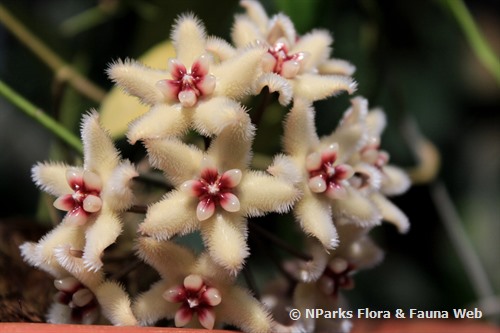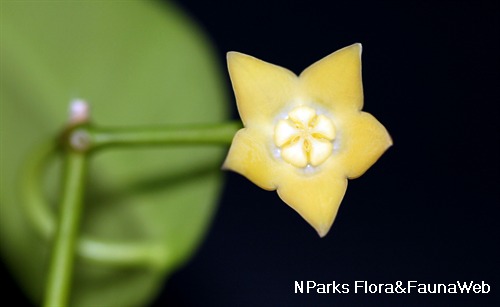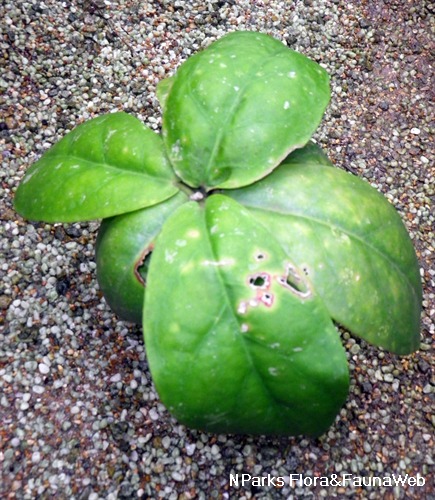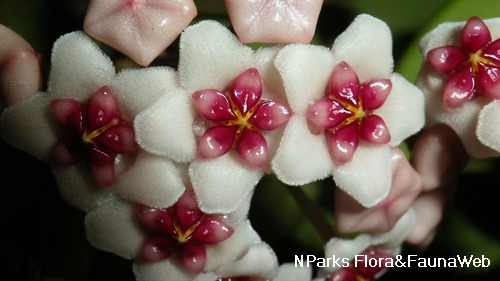
Back
Hoya latifolia G. Don
| Family Name: | Apocynaceae |
Hoya latifolia is an epiphytic climber that is native to Singapore. It has clusters of light pink flowers that bloom like a gorgeous spectacle of fireworks. On closer inspection, individual flowers are star-shaped, and blooms can last for several days. A beautiful ornamental plant that can be grown in semi-shade or indirect light, suitable for anyone looking to brighten their living space to welcome the new year!
Name
Classifications and Characteristics
| Plant Division | Angiosperms (Flowering Seed Plants) (Dicotyledon) |
|---|---|
| Plant Growth Form | Climber, Epiphyte |
| Lifespan (in Singapore) | Perennial |
| Mode of Nutrition | Autotrophic |
| Maximum Plant Spread / Crown Width | 10 m |
Biogeography
| Native Distribution | Borneo, Java, Malaya, Myanmar, Thailand and Sumatra. |
|---|---|
| Native Habitat | Terrestrial |
| Preferred Climate Zone | Tropical |
| Local Conservation Status | Native to Singapore (Least Concern (LC)) |
Description and Ethnobotany
| Growth Form | A large, epiphytic or hemi-epiphytic climber that grows up to 10 m long. Plant has white sap in all vegetative parts. |
|---|---|
| Roots | Adventitious roots grow along the stems. |
| Foliage | Petioles are cylindrical, 1 - 2 (can be up to 3.5) cm long. Leaf blade is fleshy and stiff, broadly ovate to broadly lanceolate, measuring 10 - 20 (-30) cm long by 7 - 15 (-20) cm wide, apex acute, acuminate or cuspidate, base obtuse or rounded. Leaf blade has lighter green on the undersides with darker midrib, midrib is raised on the upper surface, palmate venation. |
| Stems | Smooth stem, twining or pendulous, internodes are usually 10 - 20 cm long. Stem is green or reddish when young, turning dark green or greyish brown when matures. |
| Flowers | Flowers are borne in clusters of 3 - 5 cm in diameter, with 10 - 30 flowers per cluster. The inflorescence (umbelliform) are clustered together along a pendulous branches. Flower is about 7 - 10 mm in diameter, corolla is pale green or yellow or pink, and is finely pubescent on the inside. |
| Fruit | Follicle, long and linear measuring 10 - 15 cm long and 0.4 - 0.5 cm wide. |
| Habitat | It is found growing in lowland primary and secondary forests, and occasionally on roadside trees. This plant climbs on larger main branches where it is shaded by tree canopy. |
| Taxonomy | According to Anthony Lamb and Michele Rodda (A Guide to Hoyas of Borneo), there are two known forms. One has pink flowers and is maroon on leaf venation and underside of the leaf blade. The other one has pale green or yellow flowers and is green on leaf venation and underside of the leaf blade. |
| Etymology | The specific epithet latifolia means broad leaves. |
| Ethnobotanical Uses | Medicinal: Latex has diurectic properties and is used in the treatment of ascites (accumulation of fluid in peritoneal cavity) |
Landscaping Features
| Landscaping | This climber has 2 different colour forms of flowers (pink and yellow-green) and foliage, suitable for container planting and in gardens and parks. |
|---|---|
| Desirable Plant Features | Ornamental Flowers, Ornamental Foliage |
| Landscape Uses | Parks & Gardens, Small Gardens, Skyrise / Balcony, Interiorscape/ Indoor Plant, Container Planting |
| Usage Hazard - Cons | Irritant - Sap |
| Usage Hazard - Cons Remarks | Avoid contact with milky/ white sap as it may cause skin irritation in certain individuals. Keep plants away from children and pets as sap could be toxic. |
Fauna, Pollination and Dispersal
| Pollination Method(s) | Biotic (Fauna) |
|---|
Plant Care and Propagation
| Light Preference | Semi-Shade |
|---|---|
| Water Preference | Moderate Water |
| Plant Growth Rate | Moderate |
| Rootzone Tolerance | Moist Soils, Well-Drained Soils, Easy to Grow |
| Propagation Method | Stem Cutting |
Foliar
| Foliage Retention | Evergreen |
|---|---|
| Mature Foliage Colour(s) | Green |
| Mature Foliage Texture(s) | Leathery, Thick |
| Prominent Young Flush Colour(s) | Purple |
| Young Flush Texture(s) | Leathery, Thin |
| Foliar Type | Simple / Unifoliate |
| Foliar Arrangement Along Stem | Opposite |
| Foliar Attachment to Stem | Petiolate |
| Foliar Shape(s) | Non-Palm Foliage (Ovate) |
| Foliar Venation | Palmate |
| Foliar Margin | Entire |
| Foliar Apex - Tip | Acute, Acuminate, Cuspidate |
| Foliar Base | Rounded / Obtuse |
| Prominent Young Flush Colour(s) Remarks | Young leaves dark purplish red in some specimens. |
Non - Foliar and Storage
| Stem Type & Modification | Woody |
|---|
Floral (Angiosperm)
| Flower & Plant Sexuality | Bisexual Flowers |
| Flower Colour(s) | Pink, Green - Light Green, Cream / Off-White |
|---|---|
| Flower Texture(s) | Waxy, Velvety / Furry / Tomentose |
| Flower Grouping | Cluster / Inflorescence |
| Flower Location | Axillary |
| Flower Symmetry | Radial |
| Individual Flower Shape | Stellate / Star-shaped |
| Inflorescence Type | Umbel |
| Flower Lifespan on Plant | Several Days |
Fruit, Seed and Spore
| Mature Fruit Texture(s) | Smooth |
|---|---|
| Fruit Classification | Simple Fruit |
| Fruit Type | Dehiscent Dry Fruit |
| Seed Description | Seeds are oblong, measuring 4 - 4.5 (can be up to 7) mm long by 1 - 1.5 mm wide, having soft hairs at the tip, 3 - 4 cm long. |
| Seed Quantity Per Fruit | Few (1-5) |
Image Repository
Others
| Master ID | 30800 |
|---|---|
| Species ID | 5155 |
| Flora Disclaimer | The information in this website has been compiled from reliable sources, such as reference works on medicinal plants. It is not a substitute for medical advice or treatment and NParks does not purport to provide any medical advice. Readers should always consult his/her physician before using or consuming a plant for medicinal purposes. |









